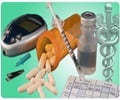Diabetic individuals considering a mountain journey need to understand the potential risks of the environmental extremes they may experience at high altitudes.

Paul Richards, Centre for Altitude, Space and Extreme Environmental Medicine, University College (London, U.K.) and David Hillebrandt, President, International Mountaineering and Climbing Federation (Bern, Switzerland), discuss the harmful effects that altitude, temperature extremes, reduced oxygen levels, and physical exertion may have on people with diabetes when they travel to destinations at high altitude for business or pleasure.
In the article "The Practical Aspects of Insulin at High Altitude" the authors explore issues related to diabetes management, such as the risk that insulin may become less effective when exposed to heat or cold and how to store it properly. They also caution that blood glucose measuring devices may be less accurate at high altitude.
"With the rising prevalence of diabetes, its management is increasingly becoming an issue at high altitude," says John B. West, MD, PhD, Editor-in-Chief of High Altitude Medicine & Biology and Professor of Medicine at the University of California, San Diego School of Medicine. "This statement by two experts in the field is a valuable contribution in a difficult area."
Source-Eurekalert
 MEDINDIA
MEDINDIA




 Email
Email










